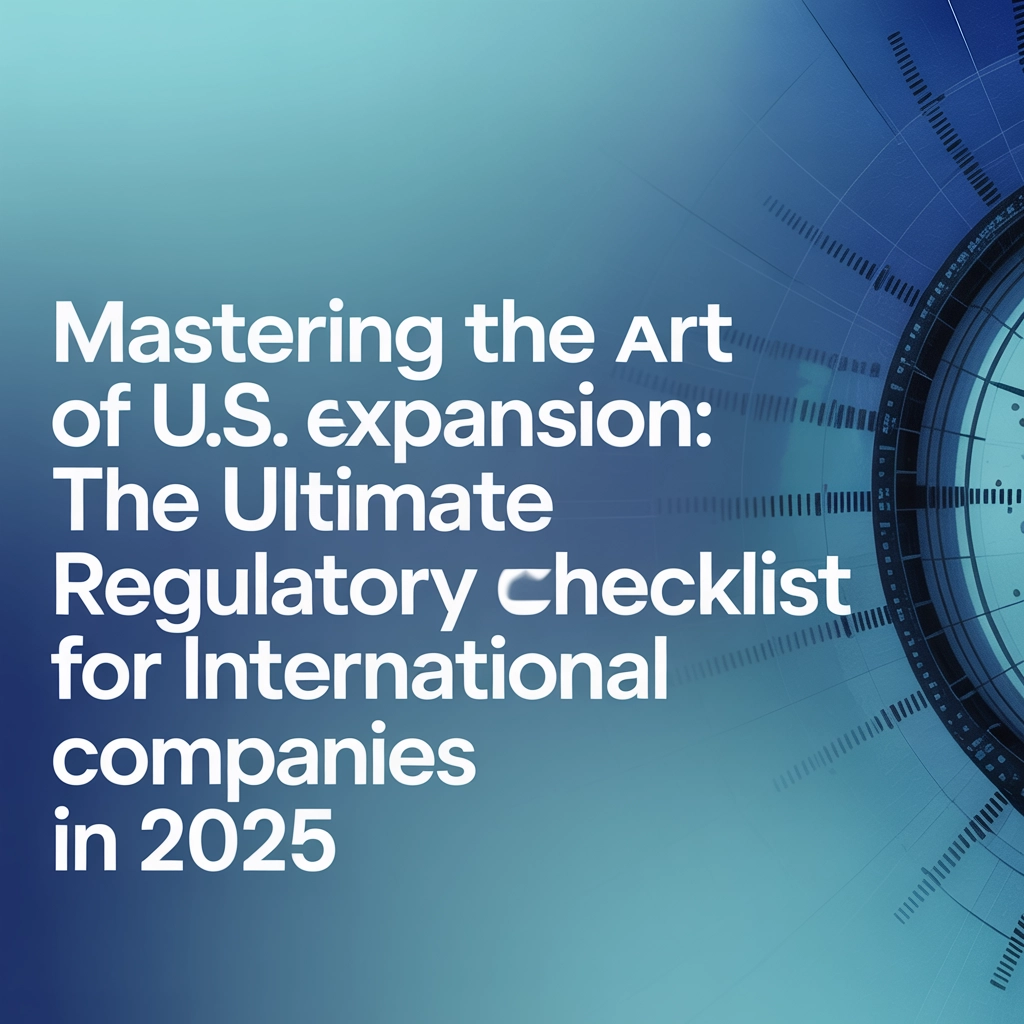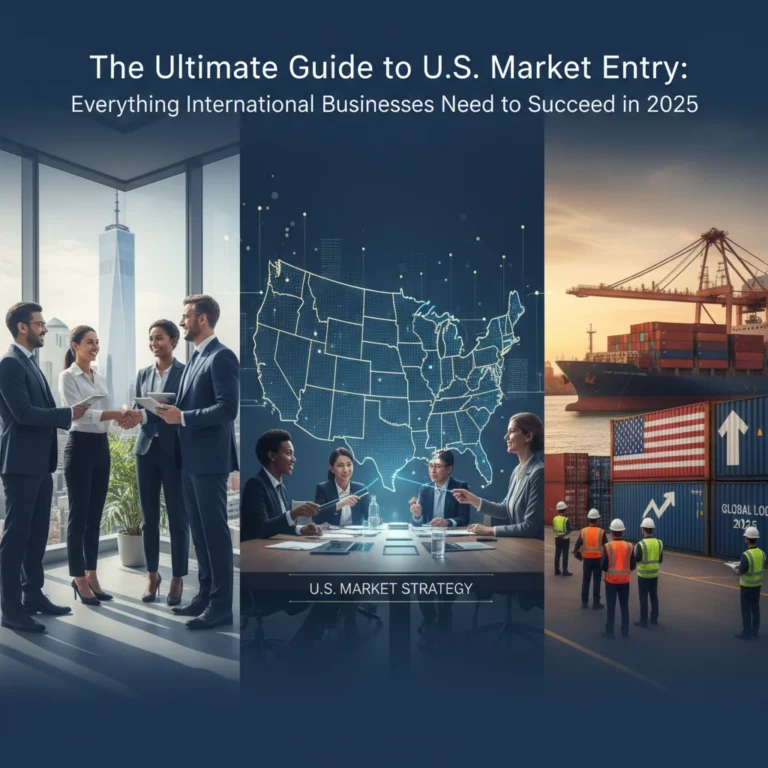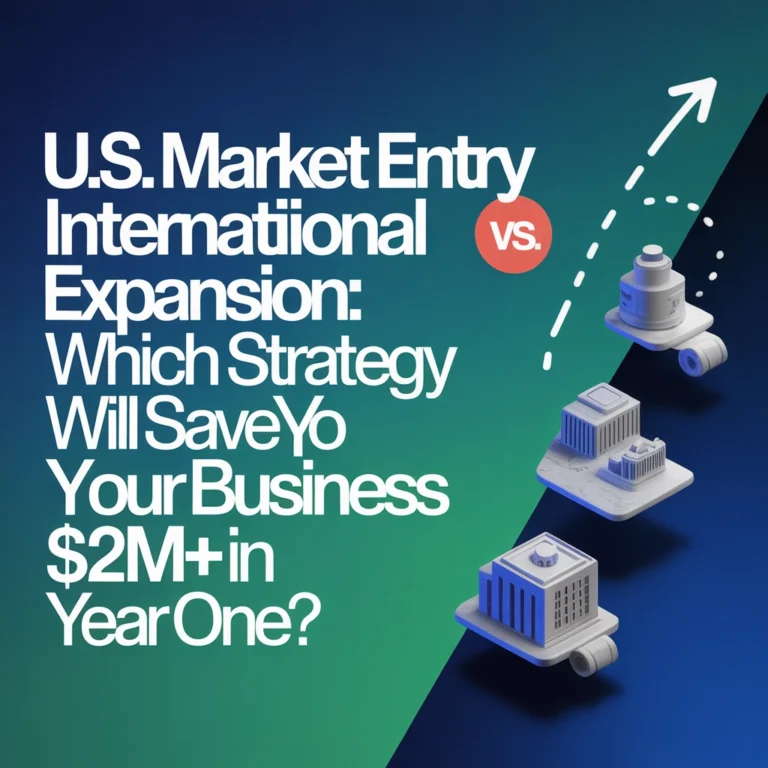Mastering the Art of U.S. Expansion: The Ultimate Regulatory Checklist for International Companies in 2025

The 2025 regulatory landscape in the United States is more challenging—and more rewarding—than ever for international companies with their eyes on American growth. From heightened investment scrutiny to beefed-up compliance and cybersecurity expectations, it’s a whole new world for foreign businesses entering the U.S. market. If you want to launch, scale, and succeed, get these essentials dialed in.
U.S. Entity Formation & Basic Compliance
Getting your U.S. legal foundation set up correctly is the key to a smooth landing. Here’s your checklist:
- Select Your Entity Type: Most global firms opt for a Limited Liability Company (LLC) or a C Corporation. Delaware, Wyoming, and Florida remain top picks, thanks to their rapid processing, business-friendly regulations, and rock-solid legal framework.
- Obtain Your EIN: Secure an Employer Identification Number (EIN) from the IRS. You’ll need this for everything from payroll to U.S. tax filings and opening that all-important American bank account.
- Open a U.S. Business Bank Account: This is vital for processing payments in USD, managing cash flow, and integrating with major platforms like Stripe and PayPal. Many banks require U.S. entity status and an EIN.
- Appoint a Registered Agent: Every state requires your business to have a registered agent who can receive legal and governmental notices on your behalf.
- Draft an Operating Agreement: Create a solid agreement outlining business operations, structures, and founder rules. This isn't just a box to check—it's essential for legal protection and smooth founder relationships.
- Implement a Compliance Dashboard: Invest in software or professional support to keep you on top of regulatory filings, timelines, and critical compliance tasks.

Foreign Investment Policy, CFIUS, and America First
This year’s big update: The America First Investment Policy, rolled out for 2025, dialed up the restrictions on foreign direct investment—especially in critical sectors and where overseas adversaries might be involved.
- CFIUS Scrutiny: The Committee on Foreign Investment in the United States (CFIUS) now has an even wider scope. All investments in technology, infrastructure, agriculture, healthcare, and energy are under the microscope.
- PRC & Adversarial Restrictions: Chinese-affiliated companies will face enhanced scrutiny—if your entity structure includes any PRC ties, you’ll need bulletproof documentation and may face additional reporting, delays, or outright restrictions.
- Emerging Tech Focus: AI, aerospace, quantum computing, and advanced manufacturing are all in the crosshairs. Expect closer review of investments involving foundational and emerging technologies.
- Fewer Mitigation Agreements, More Final Actions: Regulatory agencies want quicker, more decisive compliance measures—so be ready for clear, non-negotiable compliance deadlines.
Pro Tip: Engage U.S.-based legal advisers early. A qualified partner (like the experts at USLaunch) can help you structure your venture to minimize red tape and maximize speed.

The Buy American Act & Federal Procurement in 2025
U.S. expansion means fresh opportunities to win government and infrastructure contracts—if you play by the new rules. Here’s how the Buy American Act changes the game in 2025:
- 65% Domestic Content Requirement: All federally funded projects now require that 65% of the cost of manufactured products and construction materials comes from domestic sources. This jumps to 75% by 2029.
- Proof, Not Promises: Expect to provide detailed supply chain documentation. Failure to comply means disqualification before you ever get to bid.
- Complex Sourcing: Multinational supply chains must be ready for detailed audits—all the way down to the sub-supplier level for prime contractors.

Data Protection & Cybersecurity Musts
Data regulations in the U.S. get tighter each year, but 2025 is seeing a real leap forward. Here’s a breakdown of what international businesses need to prioritize:
- ISO/IEC 27001:2022 – Deadline: October 31, 2025. Ensure your info security management practices align with new controls covering threat intelligence, cloud systems, and streamlined risk management.
- PCI DSS 4.0 – Deadline: March 31, 2025. If you handle credit card data, get ready for stricter authentication standards, longer log retention, and more dynamic, risk-based compliance.
- GDPR Updates: Even if you’re U.S.-based, serving EU citizens brings stricter requirements around AI use, individual data rights, and cross-border transfers.
- HIPAA for Healthcare: Healthcare companies now face more frequent data breach reporting, tougher encryption rules, and detailed AI governance.
Not meeting these standards is a recipe for lost contracts, fines, and reputational hits—so prioritize compliance from day one!

Tariffs, Trade Policy & How They Might Impact You
America’s 2025 trade and tariff policy is more unpredictable than ever:
- Reciprocal Tariffs: The U.S. is moving toward tariffs that mirror those of its trading partners. What does this mean day-to-day? Customs duties may fluctuate with little warning.
- Changing Alliances: New trade agreements are opening some doors while closing others. Keep in touch with trade counsel to navigate shifting rules and opportunities.
- Import/Export Permits: For certain products—especially technology or regulated goods—you’ll need licenses or permits to keep goods flowing through customs.
The smarter your compliance processes and documentation, the less vulnerable you’ll be to sudden regulatory changes.
The Ultimate 2025 U.S. Expansion Regulatory Checklist
Before you take that exhilarating leap into the U.S. market, make sure you’ve got all this covered:
-
Business Formation
- Chosen entity type (LLC/C-Corp)
- Employer Identification Number (EIN)
- Registered U.S. bank account
- Appointed registered agent
-
Operational Compliance
- Operating agreement in place
- Compliance dashboard or expert provider engaged
- All key insurance policies set up
-
Investment & Ownership
- CFIUS questionnaire/documentation completed
- Ownership structure transparency
- Check for adversarial-country affiliations
-
Procurement & Supply Chain
- Ability to trace and document domestic content
- Buy American Act audit procedures in place
-
Data Security & Privacy
- ISO/IEC 27001:2022 compliance
- PCI DSS 4.0 adherence if handling payment card data
- GDPR and HIPAA preparation (as applicable)
-
Trade
- Trade counsel or customs advisor retained
- Permits and licensing for imported/exported products sorted
-
Employee and HR Protocols
- U.S. payroll provider setup
- Labor law and immigration compliance (I-9 forms, visas, hiring documentation)

Why Proactive Compliance Is Your Superpower
Smart international businesses know that proactive compliance isn't just about “doing it right”—it’s about accelerating your launch and lowering your risk of fines, project loss, or brand damage. The U.S. is an incredible market—if you master these regulatory essentials, you’ll set yourself up for serious stateside success.
Need a launch partner who lives and breathes this stuff? USLaunch helps global businesses land smart, scale fast, and win big in the U.S. market—no guesswork, just results.
Learn more about how we can help at USLaunch.
Ready for your U.S. expansion? Your regulatory checklist is your launchpad. Save it. Pin it. Build your dream—compliantly!






